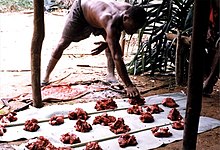Primitive communism
Primitive communism is a term that was used by Karl Marx and Fredrich Engels to describe hunter-gatherer societies and how they shared resources among each other.[1][2][3] Primitive means in the early stages of development, so primitive communism is an early form of communism.
Traits
[change | change source]
In a primitive communist society, there is no extra stuff for people to hoard. Instead, things like food and housing are shared equally among all members of the community.[4][5][6][7] There was no such thing as money. Also, everyone in a primitive communist society had to help get food. There was no authoritarianism and no concept of a state.[8] Instead, everyone has an equal say in what goes on in the society. This is called egalitarianism.
Agriculture led to the creation of the private ownership of land. The extra food that could be grown meant that some people didn't have to work to get food. These people started to get other jobs and that led to the creation of social class. This is when people started thinking that some jobs were more important than others and when slavery became a thing.
Marxism
[change | change source]Marx and Engels got the idea of primitive communism from the American anthropologist, named Lewis H. Morgan. Morgan did a lot of research on the Iroquois people, who lived in big groups and shared everything that they grew, hunted, and gathered.[9] Marx and Engels thought that the Iroquois lived in a society that had communist traits.
References
[change | change source]- ↑ Scott, John; Marshall, Gordon (2007). A Dictionary of Sociology. USA: Oxford University Press. ISBN 978-0-19-860987-2.
- ↑ Felluga, Dino (1 January 2011). "Introductory Guide to Critical Theory - Modules on Marx: On the Stages of Economic Development". Purdue University. Archived from the original on 28 February 2021. Retrieved 3 February 2021.
- ↑ Bealey, Frank (August 1999). The Blackwell Dictionary of Political Science. Blackwell Publishers. ISBN 978-0-631-20695-8.
- ↑ Ward Gailey, Christine (September 2016). "Locating primitive communism in capitalist social formations". Dialectical Anthropology. 40 (3): 259–266. doi:10.1007/s10624-016-9431-8. S2CID 148006390.
- ↑ Stearns, Peter N.; Adas, Michael B.; Schwartz, Stuart B.; Gilbert, Marc Jason (2004). "The Neolithic Revolution and the Birth of Civilization". World Civilizations: The Global Experience. Pearson. ISBN 9780321164254. Archived from the original on 26 July 2010.
- ↑ Svizzero, Serge; Tisdell, Clement A. (2016). "Economic evolution, diversity of societies and stages of economic development: A critique of theories applied to hunters and gatherers and their successors". Cogent Economics & Finance. 4 (1). doi:10.1080/23322039.2016.1161322.
- ↑ Tomba, Massimiliano (9 November 2012). Marx's Temporalities. Brill. ISBN 978-90-04-23679-0.
- ↑ Lee, Richard; DeVore, Irven (1969). Man the Hunter. Aldine Transaction. ISBN 978-0-202-33032-7.
- ↑ Morgan, Lewis H.; Powell, John Wesley (1881). "Contributions to North American Ethnology, Volume IV: Houses and house life of the American aborigines". Monograph. doi:10.3133/70039925.
Text is available under the CC BY-SA 4.0 license; additional terms may apply.
Images, videos and audio are available under their respective licenses.
